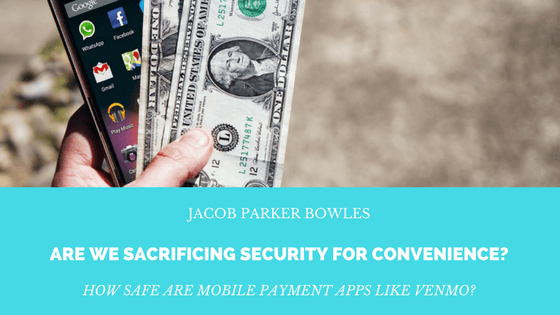How safe are mobile payment apps like Venmo?
How many times have you gone out for dinner and drinks with friends, and when it comes time to pay the bill, you either end up paying more than you should have when someone suggests you split the bill evenly or you opt not to split the bill at all, so you scramble to figure out what you owe, and everyone is throwing down bills into a messy pile? Trying to split a bill between several people can get chaotic; thus, Venmo was born. You’ve probably heard of Venmo or other apps like it. Even if you don’t use Venmo yourself, you’ve likely heard something like, “I’ve got it. Just Venmo me!”
Mobile payments apps like Venmo have taken the world of mobile technology by storm. Many major restaurant chains and stores, such as Starbucks, have their own versions of mobile payment apps, so that loyal customers can keep a balance to pull from whenever they need their coffee fix. Last May, things turned bitter like a bad cup of coffee when multiple media stations such as CNN and ABC reported that the Starbucks app had been hacked and money stolen from multiple customer accounts. Starbucks claimed in an official statement, however, that these were false accusations.
So what is the real story here? If these apps sound almost too good to be true, well that may actually be the case. As the leader in mobile payment processing, Venmo, owned by Paypal, processes hundreds of millions of dollars of transactions each month. In the third quarter of 2014, Venmo processed more than $700 million in payments which was nearly five times the volume of transactions it had just a year earlier.
Yet, it may be that Venmo took off before it was properly equipped to handle such a steady stream of transactions. According to Slate staffwriter Alison Griswold, “For all its promise, Venmo’s popularity seems to be outpacing its customer-support capabilities.” In November 2014, three years after Venmo lefts its beta phase, it had only 70 full-time employees in contrast to parent company Pay Pal’s more than 10,000. There is no dedicated customer service phone line and the company is reportedly slow to respond to customer concerns and complaints. Additionally, Venmo does not send out an alert if login credentials are changed from within the account.
If Venmo’s customer service is lagging, it raises the question of just how secure this wildly popular app really is. As popular as mobile payment technology is becoming, it has not yet reached its full potential, and that is due to a lack of trust. Security concerns are the primary reason many consumers remain reluctant to adopt mobile payments, according to Wired.
In general, according to The Huffington Post, mobile payment apps are still in their infancy, and as such, are by no means foolproof against hackers. Also, smart phones themselves are not the most secure means of making transactions, because you must rely on several different forms of technology to come together safely and efficiently. Your phone can easily be broken into even with a password, the various softwares that power mobile apps are vulnerable to security breaches, and the wireless signals put out by phones (especially if you are using a public wifi network) are prone to being hacked.
I hope, by raising your awareness to the security concerns associated with mobile payment apps, that I did not scare you away from this technology entirely, because while it still has a lot of kinks to work out, there are security threats with just about every form of digital technology out there. Just a few simple suggestions to keep in mind: try using a platform that requires two-factor authentication and always use unique passwords for all of your accounts. That way, hackers will be less likely to steal information from more than one of your accounts. As long as you are smart about taking added precautions to protect your private information, there’s nothing keeping you from giving some of these mobile payment apps a try.

